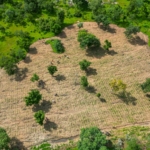
Leaders from the realms of science, business, and media will converge to present and inspire positive change at the event titled “Solutions to the Climate and Nature Crisis: Tipping the Balance from Negative to Positive” scheduled for Wednesday, January 17, 2024, at Davos, Switzerland.
A distinguished panel will delve into discussions on propelling advancements in climate action, featuring notable speakers including Himanshu Gupta, Chief Executive and co-founder of ClimateAi, Ellen Jackowski, Chief Sustainability Officer at Mastercard, and media influencers Dr. Jonny Keeling, Head of the BBC Natural History Unit, Emily Renshaw-Smith, Director of Operations for Open Planet at Studio Silverback, and Sam Sutaria, Chief Executive of WaterBear.
The event will commence with the presentation of the Global Tipping Points Report, an extensive analysis encompassing both negative and positive tipping points – an unprecedented endeavour. The proceedings will culminate with a convivial mulled wine drinks reception.
Arctic Basecamp, the science communications platform spearheaded by Professor Gail Whiteman from the University of Exeter Business School, will host the event. Notably, Arctic Basecamp annually establishes an Arctic research tent at the World Economic Forum.
Leveraging the insights from the recently released and highly acclaimed Global Tipping Points Report, the University has organised a series of events aimed at presenting solutions to the ongoing climate crisis.
Professor Gail Whiteman, who has been a consistent attendee at the World Economic Forum since 2017, spearheads the science curation for the forum’s new ‘Climate Tipping Points Hub.’ This virtual reality space, embedded within the WEF’s immersive metaverse, serves as a platform for exploring critical climate-related issues.
As part of the Earth Decides community, Professor Whiteman will actively participate in key events throughout the week. This includes involvement in the session titled “Earth Decides: Cultivating Informed Optimism” at the main WEF Congress Centre and leading the WEF Open Forum session “On Thin Ice: The Consequences of Climate Breakdown,” which will delve into the irreversible collapse of Arctic summer sea ice (livestreamed here).
Arctic Basecamp, under Professor Whiteman’s leadership, will conduct a series of events at Davos focusing on the Polar Region, highlighting business and health risks associated with polar change, climate tipping points, and launching tools designed to mitigate climate risks.
Additionally, the University of Exeter Business School will host a distinctive event on Thursday, January 18, where Dr. Jonny Keeling and Sam Boynton from BBC Studios’ Natural History Unit will provide insights into the global television hit “Planet Earth III.” The event will feature never-before-seen footage showcasing a new generation of individuals on the frontline of conservation, dedicated to saving wildlife.
The Hub Culture ICEHouse will host an event featuring a presentation on the Global Tipping Points Report, led by the report’s lead author, Dr. Steven Smith. Other distinguished speakers include Dr. Andrew Steer, President and Chief Executive of the Bezos Earth Fund, and Professor Alexandra Gerbasi, Pro-Vice Chancellor and Executive Dean of the Faculty of Environment, Science, and Economy at the University of Exeter.
The Arctic Basecamp event, “Impacts of Global Tipping Points on Health,” set to take place at the SDG Tent on January 17, will delve into the connection between climate change and global health risks. Dr. Catherine Sorbara, Deputy Director of Arctic Basecamp, will lead a high-level panel discussion featuring industry leaders discussing the current and future impact of climate change on health. The discussion will also explore mobilizing leadership for a global response.
Among the expert speakers on the panel, Professor Alexandra Gerbasi will make a special announcement about a new research project focused on understanding the impact of polar climate change on global health and healthcare.
Speaking about the University of Exeter’s involvement at the World Economic Forum, Professor Gerbasi said: “We are focused on using our climate science to offer the solutions to the climate and ecological crisis that are so urgently needed. But putting positive change into action requires collaboration from a range of actors, from business leaders to government decision-makers and the scientific community, which is why I’m looking forward to participating in Exeter’s programme in Davos this year.”
Professor Whiteman said: “I’m excited to be returning to the World Economic Forum with the University of Exeter and Arctic Basecamp, and being involved in some key events that aim to kick-start the conversations that will drive change, as well as launching some ground-breaking tools that will offer new ways for businesses, policymakers or anyone else to mitigate climate risks.”
“Our understanding of the risks of climate tipping points – of which the five most likely to be triggered are in the Poles – as well as positive tipping points that offer transformative change for the better, is improving all the time, and these ideas must be communicated to our leaders so they make the right decisions to tackle climate change, biodiversity loss and other planetary pressures.”
Source: JoyOnline